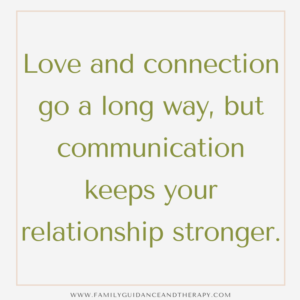Tania Hormozi, PsyD, LMFT
Over the years, I have seen couples in therapy in a variety of settings.
I have worked with couples in domestic violence situations, in crisis management, substance uses clinics, psychiatric hospitals (both inpatient and outpatient), and in private practice. The number one reason most couples seek therapy for their relationship is typically due to communication issues.Good Communication consists of a variety of areas:
- Listening
- Awareness/Perspective
- Interactive dialogue
- Being Honest with self and other
- Providing a safe place
- Not entering a conversation with preconceived assumptions
When couples are able to accept and acknowledge the aforementioned areas in communicating, they are headed towards a successful part of their couple relationship. Becoming aware of yourself, the way you speak, the way your tone of voice sounds, and how you communicate when you are sad, angry, or happy are all areas that couples need to learn to be aware of, when communicating with their partners. Communication involves Interactive dialogue. Partners need to ensure that both parties are able to have a safe place where they can speak their mind without judgement.
Listening
The number one aspect of communicating is Listening. Most individuals think they are listening when they are communicating, but most individuals, humans in general have racing thoughts, stressors, and emotions running through their mind so fast, that it’s hard to shut that off when communicating with other people, especially people that we are emotionally attached and connected to. Therefore, we enter a conversation with Preconceived assumptions or dialogue, that isn’t reality. These assumptions cause us to avoid or ignore what the other person is actually conveying, and results in conflict, argument, and shutting down. Humans do this all the time, but the moment the individual and/or couple become aware of this, they are able to train themselves to listen more, and think less. Notice, I did not say, listen more, talk less. Thinking is the reason humans don’t listen to others, we spend the majority of our lives in our head, thinking, reminiscing, figuring things out, analyzing, etc. Instead, the easier thing to do is utilize our partners and the trusted people in our lives to brainstorm, consult, discuss, etc.
Communication is an important factor in any relationship that you engage and partake in, whether it’s romantic, friendship, or family. If you have a good connection, or chemistry with someone, but don’t communicate well, that chemistry will lose itself, and then you are left with nothing.
When couples are able to accept and acknowledge the aforementioned areas in communicating, they are headed towards a successful part of their couple relationship.
Perception
Perception is the next important factor. When an individual is perceiving something differently than conveyed, or discussed, taking that into consideration is important for the couple relationship to work well. Perception is the other reason people seek therapy. Sometimes, we live our lives in a straight line, and when we stumble upon curves in our path, we don’t know what to do, we figure it out on our own, but seeking help is also a courageous thing to do. Therapy provides a different perspective to the situation, whether it’s for couples, individuals, families, or children. It allows a third party who is not connected or attached to the person listen, analyze, observe, and communicate what is being perceived, and suggest a new way to view the situation. It’s always helpful that this third party doesn’t know the whole story, or doesn’t have any emotional connection with the parties involved, so that the ideas or suggestions are objective.
Honesty
Most of the time honesty with self, the other person, and your therapist or third party is important as well. Seeking this outside person to enter your world and observe and listen requires individuals to ensure that honesty is being conveyed in conversations and descriptions of the situation at hand. Honesty brings forward allowing for individuals to have a safe place to share their thoughts without the fear of being judged, belittled, or discriminated against, for any reason. Most individuals bring experiences, fears, and anger from previous relationships into current ones, and if the place is not safe, they will always have their guard up when wanting to share or express their deepest concerns, thoughts, and feelings.
If you have a good connection, or chemistry with someone, but don’t communicate well, that chemistry will lose itself, and then you are left with nothing.
Couples who communicate effectively are able to engage in conversations with their partners utilizing the aforementioned items. When a couple is able to acknowledge and accept that they are working on their flaws, and are willing to compromise, and work on listening, providing a safe place, or not allowing assumptions fog their mind, then they are able to engage in interactive dialogue with their partner, and communicate effectively.
Remember, that love and connection go a long way, but communication keeps your relationship stronger. Communication is important, but effective communication is required, not optional for a relationship to succeed, grow, and last a long time.

